In the US, Black communities bear a disproportionate burden of COVID-19 and serious influenza (flu) illness and related outcomes, along with historically lower flu vaccination rates. In the context of the ongoing rollout of COVID-19 vaccines, the National Foundation for Infectious Disease (NFID) commissioned a survey of 1,340 US Black adults to better understand beliefs about COVID-19 and flu, as well as attitudes and practices around vaccination.
Summary of Key Results
Attitudes Toward COVID-19 Vaccination
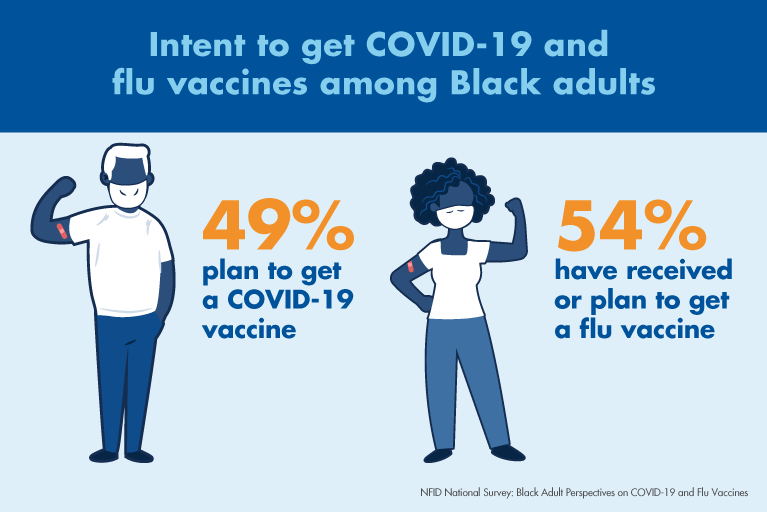
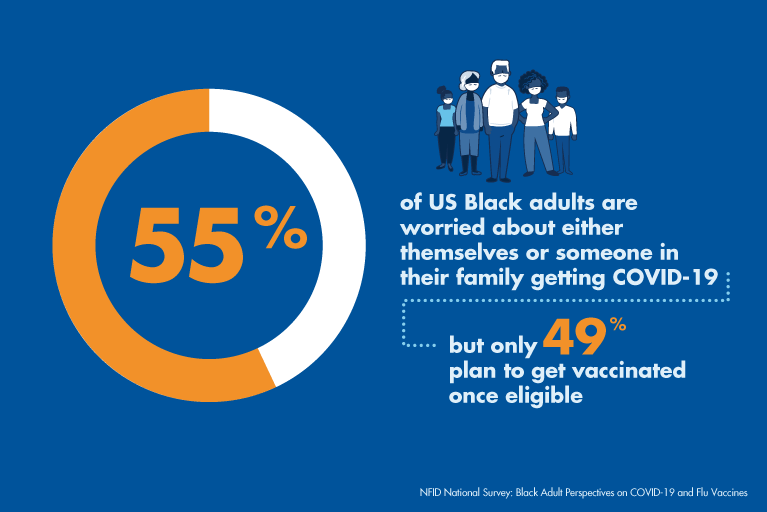
While 55 percent are worried about either themselves or someone in their family contracting COVID-19, there is considerable hesitancy regarding COVID-19 vaccines among US Black adults.
- 49 percent of Black adults plan to get vaccinated against COVID-19 once a vaccine is available to them
- Among those who plan to get vaccinated, only 19 percent plan to get immunized as soon as possible, while approximately 31 percent indicate they prefer to wait
- 30 percent say they do not plan to get vaccinated, while an additional 20 percent are unsure
- Black adults age 60+ years are most willing to be vaccinated, with 68 percent planning to get a vaccine (18 percent are unsure and 13 percent do not plan to get vaccinated)
- Black adults under age 45 years and Black women are most reluctant to get vaccinated
- Among Black adults age 18-44 years, 41 percent do not plan to get a COVID-19 vaccine and 21 percent are unsure
- 33 percent of Black women (all ages) do not plan to get a COVID-19 vaccine and 22 percent are unsure
- The gender gap in willingness to get vaccinated against COVID-19 is most pronounced among Black adults age 45+ years
- Only 43 percent of Black women age 45-59 years are willing to get vaccinated, compared to 75 percent of Black men in the same age group
- Only 59 percent of Black women age 60+ years are willing to get vaccinated, compared to 78 percent of Black men in the same age group
Reasons For Vaccinations
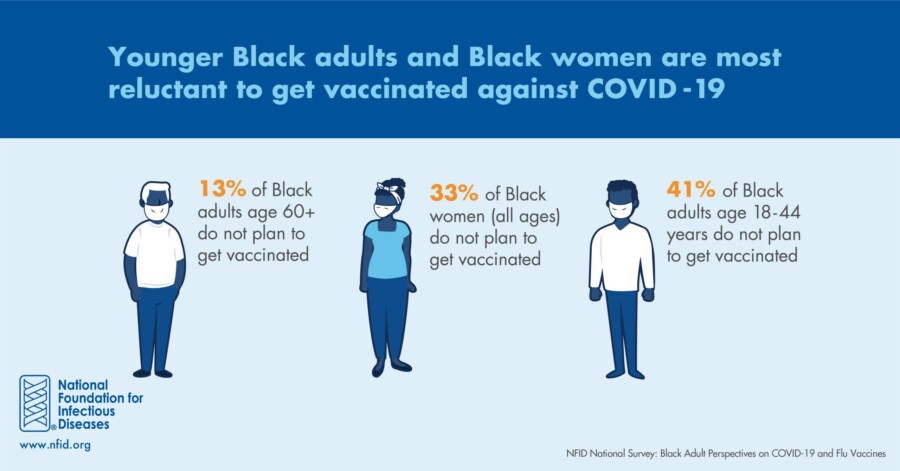 Among those who do plan to get vaccinated against COVID-19, top reasons cited include:1
Among those who do plan to get vaccinated against COVID-19, top reasons cited include:1
- To protect themselves (76 percent)
- To protect their family (73 percent)
- To avoid getting seriously ill from COVID-19 (69 percent)
- To feel safe around other people (61 percent)
- To protect their community (58 percent)
- Life won’t return to normal until most people are vaccinated (54 percent)
Among those who are unsure or do not plan to get vaccinated against COVID-19 (50 percent), top reasons cited include:1
- Concern about the development and approval of safe and effective vaccines in such a short timeframe (66 percent)
- Concern that COVID-19 vaccines would hurt or be harmful to them (45 percent)
- Concern about getting COVID-19 from the vaccines (39 percent)
- Do not think COVID-19 vaccines work very well (23 percent)
- Are not concerned about getting seriously ill from COVID-19 (14 percent)
Black women are more likely than Black men to cite concerns about the speed of vaccine development (71 percent vs. 57 percent) and being harmed by the vaccine (51 percent vs. 36 percent) as reasons for being hesitant to get vaccinated against COVID-19
Confidence in COVID-19 Vaccine Development and Rollout
Black adults lack confidence in key aspects of the COVID-19 vaccine development and distribution process.2
- Less than a quarter said they were “extremely/very confident” in vaccine efficacy (24 percent), safety (23 percent), or adequate testing specifically among US Black adults (20 percent)
- Only 16 percent said they were “extremely/very confident” that the vaccines would be distributed fairly, with nearly half (47 percent) instead saying they were “not very/at all confident” in equitable distribution
- 45 percent of those age 60+ years cited confidence in the vaccine development and approval process as a reason they would get a vaccine, compared to only 20 percent of those under age 45 years
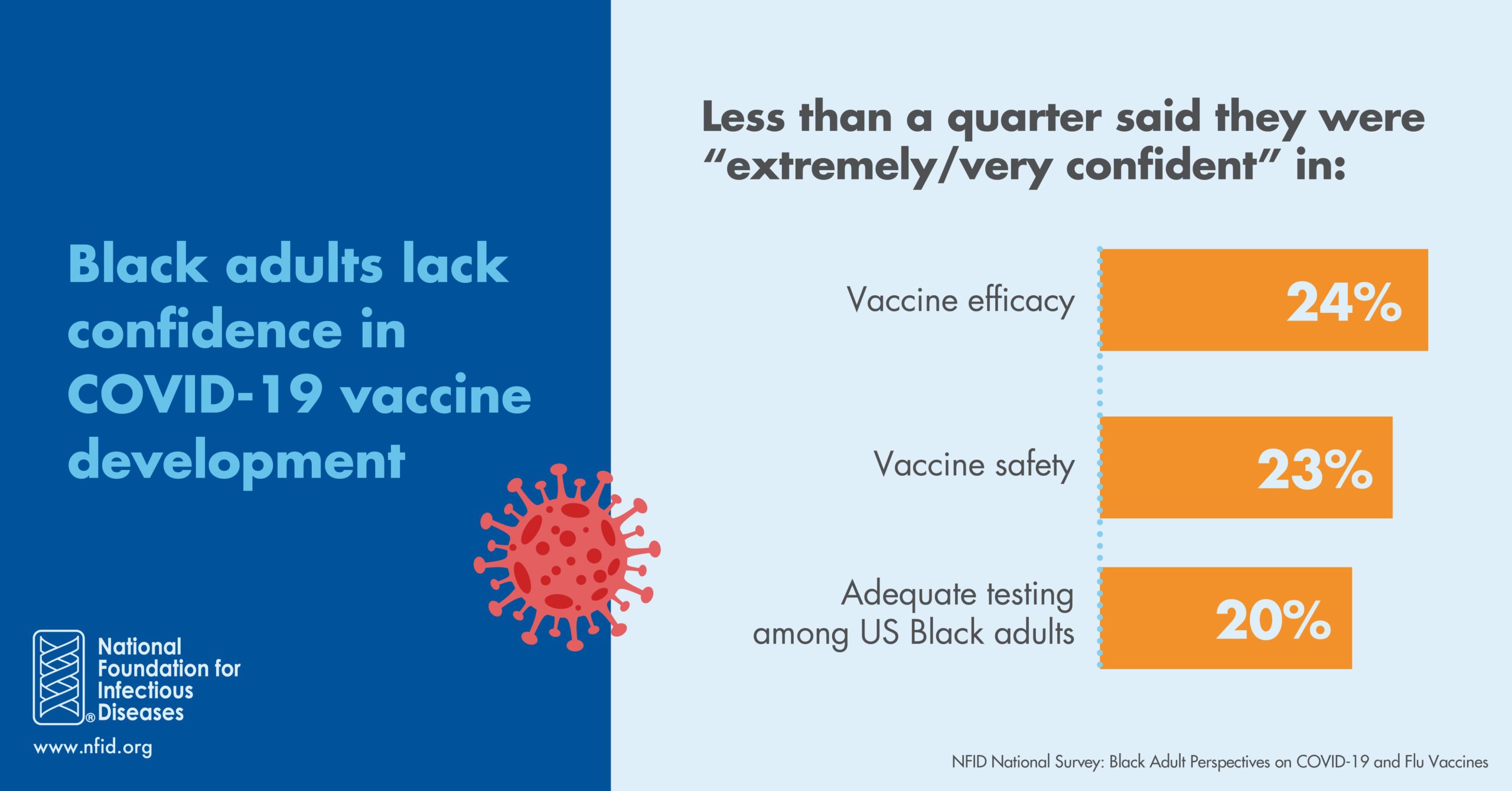
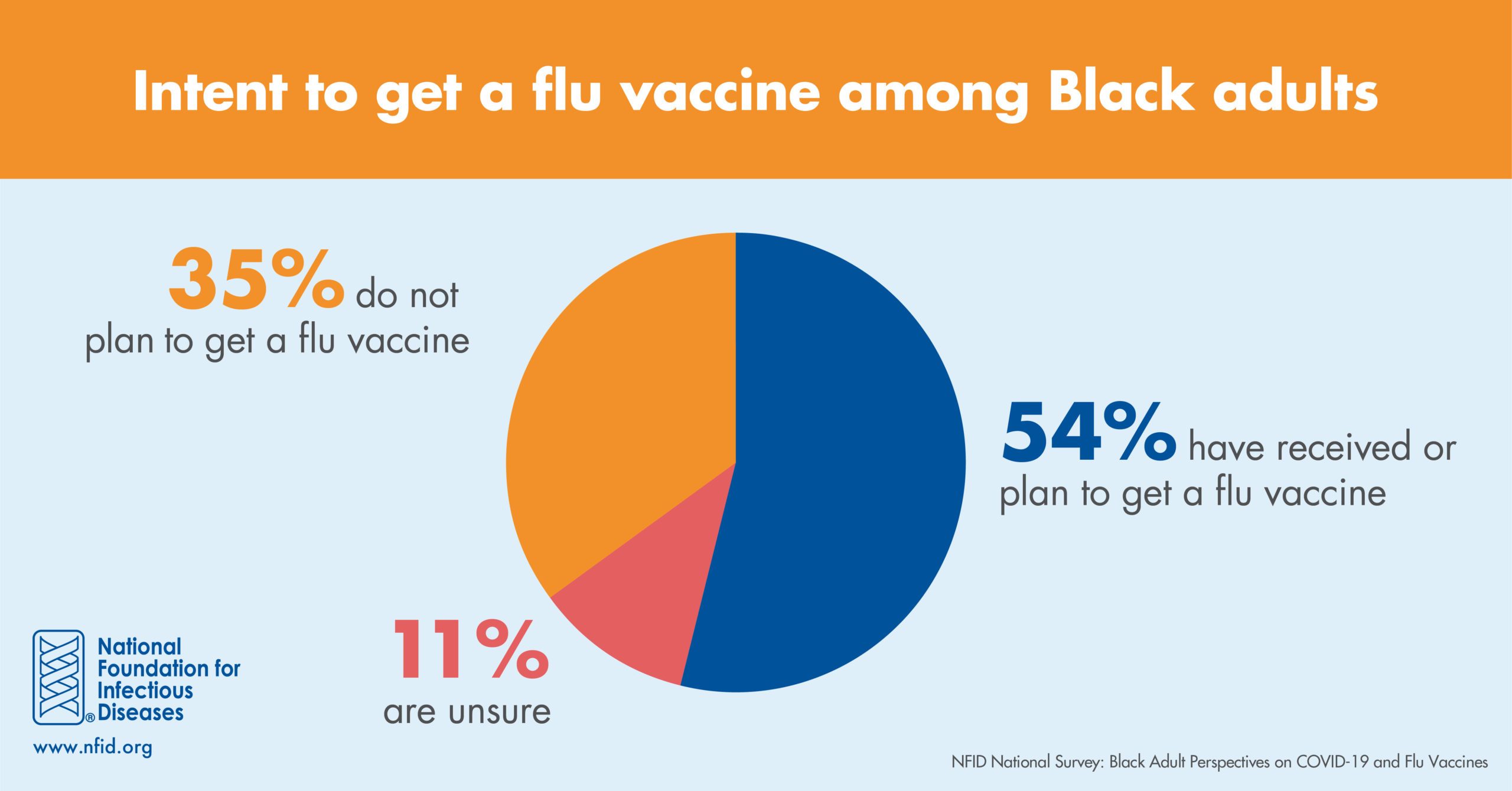
Attitudes and Practices around Flu Vaccination
A majority of US Black adults believe vaccination is the best protection against flu and have received or plan to get a flu vaccine.
- 58 percent agree that flu vaccination is the best preventive measure against flu-related deaths and hospitalizations
- 54 percent of Black adults have received or plan to get a flu vaccine during the 2020-2021 flu season while 35 percent of Black adults do not plan on getting a flu vaccine during the 2020-2021 flu season, and an additional 11 percent are unsure
- 54 percent of Black adults say the COVID-19 pandemic has not had an impact on their likelihood of getting a flu vaccine during the 2020-2021 flu season
- 31 percent say they are more likely to get a flu vaccine during the 2020-2021 flu season because of the COVID-19 pandemic
- 14 percent say they are less likely to get a flu vaccine during the 2020-2021 flu season because of the COVID-19 pandemic
Reasons for Vaccination
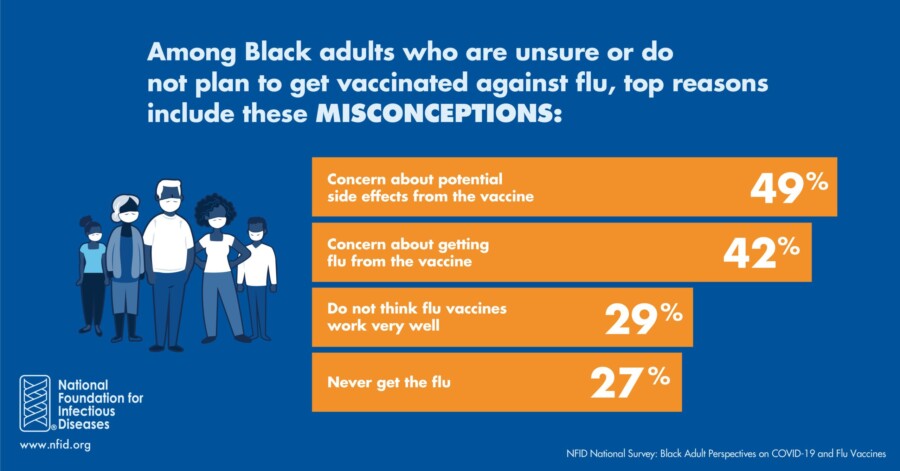 Among those who received or plan to get a flu vaccine, top reasons cited include:1
Among those who received or plan to get a flu vaccine, top reasons cited include:1
- To protect themselves (76 percent)
- To avoid getting sick with flu during the COVID-19 pandemic (63 percent)
- To protect their family (55 percent)
- To protect their community (43 percent)
- It is important because they have a chronic health condition (27 percent)
Among those who are unsure or do not plan to get a flu vaccine, top reasons cited include:1
- Concern about potential side effects from the vaccine (49 percent)
- Concern about getting flu from the vaccine (42 percent)
- Do not think flu vaccines work very well (29 percent)
- Never get the flu (27 percent)
- Concern about potential exposure to COVID-19 if they get vaccinated at a doctor’s office or pharmacy (21 percent)
Black adults age 60+ years are more inclined to believe in the efficacy of flu vaccination than younger adults (81 percent vs. 50 percent) and to get a vaccine (77 percent vs. 46 percent)
- 66 percent of individuals age 45-59 years agree vaccination is the best way to prevent flu-related deaths and hospitalizations
- 43 percent of individuals age 18-44 years agree vaccination is the best way to prevent flu-related deaths and hospitalizations
A majority (61 percent) of Black adults who are at higher risk for flu-related complications said they have already received or plan to get a flu vaccine this season3
Sources of Information about Flu Vaccination
Healthcare professionals are the primary and most trusted source of information about flu vaccination, followed by governmental agencies and Black elected officials and religious/community leaders.
Top sources trusted “a great deal/good amount” for flu vaccination information include:4
- Healthcare professionals (66 percent)
- Centers for Disease Control and Prevention (CDC) (60 percent)
- Food and Drug Administration (FDA) (51 percent)
- Black elected officials (34 percent)
- Black religious/community leaders (30 percent)
Older Black adults are particularly trusting of healthcare professionals and governmental agencies
- 75 percent of Black adults age 45+ years trust healthcare professionals a great deal or a good amount, compared to 57 percent of adults age 18-44 years
- 71 percent of Black adults age 60+ years trust CDC a great deal or a good amount, compared to 56 percent among younger age groups
Least trusted sources (trusted not much/at all) are white elected community officials (43 percent), pharmaceutical companies (33 percent), and news media (29 percent).
Antiviral Medication to Mitigate Flu Symptoms
Two-thirds (66 percent) of Black adults would take antiviral medication to mitigate severe flu symptoms if prescribed by a healthcare professional.
- Among those who said they would not take prescribed antiviral medication (32 percent), two-thirds (67 percent) are concerned about medication side effects
- Black adults age 18-29 years are more reluctant to take antiviral medication (46 percent said they would not take medication if prescribed)
Trust in Healthcare System and Scientific Institutions
Lack of trust in COVID-19 vaccine development/rollout and hesitancy toward flu and COVID-19 vaccines underscore a broader view among Black adults that the US healthcare system treats individuals unfairly based on their race or ethnic background.5
- More than half (52 percent) of Black adults said the US healthcare system “always/often” treats people unfairly based on their race or ethnic background
- This belief decreases with age; 40 percent of adults age 60+ years said the US healthcare system “always/often” treats people unfairly compared to 60 percent among those age 18-29 years
Survey Implications
These survey findings underscore the need to address health disparities and educate vulnerable populations at increased risk. It is critical to address misconceptions about COVID-19 and flu vaccine safety and effectiveness among Black communities and help build trust in the US healthcare system, in particular among younger age groups. Healthcare professionals and leaders should emphasize the following:
- There are currently safe, effective vaccines available in the US to help prevent COVID-19 and flu
- You cannot get COVID-19 or flu from the vaccines6,7
- Now more than ever, during the COVID-19 pandemic, vaccination is critical to protect yourself, your loved ones, and your community (especially those who are most vulnerable including children, adults age 65+ years, and individuals with certain chronic health conditions).
About the Survey
This NFID-sponsored survey was conducted by NORC at the University of Chicago. Data were collected using AmeriSpeak®, NORC’s probability-based panel designed to be representative of the US household population.
Interviews for this survey were conducted between December 10 and 21, 2020, with Black adults age 18 years and older representing the 50 states and the District of Columbia. Panel members were randomly drawn from AmeriSpeak, and 1,340 completed the survey—1,165 via the web and 175 via telephone. Interviews were conducted in English. The final stage completion rate is 19.6 percent, the weighted household panel response rate is 21.0 percent, and the weighted household panel retention rate is 80.4 percent, for a cumulative response rate of 3.3 percent. The overall margin of sampling error is +/- 3.8 percentage points at the 95 percent confidence level, including the design effect. The margin of sampling error may be higher for subgroups.
Once the sample has been selected and fielded, and all the study data have been collected and made final, a poststratification process is used to adjust for any survey nonresponse as well as any noncoverage or under and oversampling resulting from the study-specific sample design. Poststratification variables included age, gender, census division, and education. Weighting variables were obtained from the 2020 Current Population Survey. The weighted data reflect the US population of Black adults age 18 years and older.
About the National Foundation for Infectious Diseases
Founded in 1973, the National Foundation for Infectious Diseases (NFID) is a non-profit 501(c)(3) organization dedicated to educating the public and healthcare professionals about the burden, causes, prevention, diagnosis, and treatment of infectious diseases across the lifespan.
For more information, visit www.nfid.org/flu and www.nfid.org/coronavirus.
Acquired from https://www.nfid.org/national-survey-black-adult-perspectives-on-covid-19-and-flu-vaccines/ on 02/23/2021 courtesy of the National Foundation for Infectious Diseases.
1Top responses reflect survey respondent answers when asked to select “all that apply.”
2Responses reflect survey respondents ranking selections on scale of “extremely/very confident,” “somewhat confident,” and “not very/at all confident.”
3People at higher risk for complications for flu as defined in the survey include those age 65 years and older, smokers, those overweight or obese, and those with diabetes, asthma, chronic obstructive pulmonary disease (COPD), heart disease, sickle cell disease, kidney disease, or a weakened immune system.
4Responses reflect survey respondents ranking selections on scale of “trust a great deal/a good amount,” “trust somewhat,” and “trust not much/not at all.”
5Responses reflect survey respondents ranking selections on scale of “always/often,” “sometimes,” and “rarely/never.”
6Misconceptions about Seasonal Flu and Flu Vaccines | CDC. Centers for Disease Control and Prevention. www.cdc.gov/flu/prevent/misconceptions.htm. Accessed January 2021.
7Facts about Vaccination | CDC. Centers for Disease Control and Prevention. www.cdc.gov/coronavirus/2019-ncov/vaccines/facts.html. Accessed January 2021.
